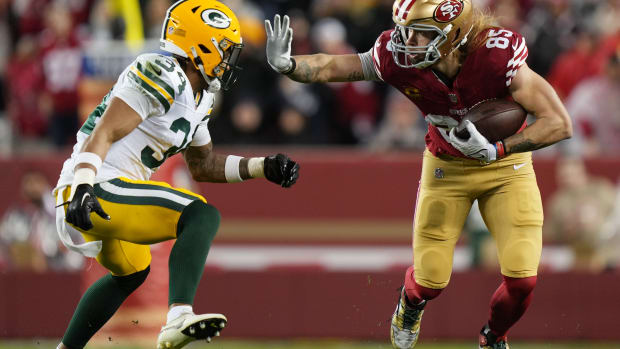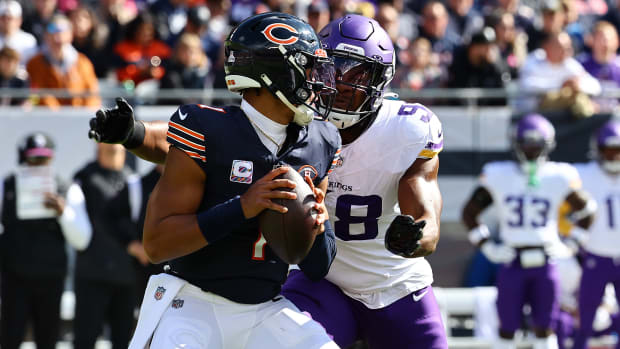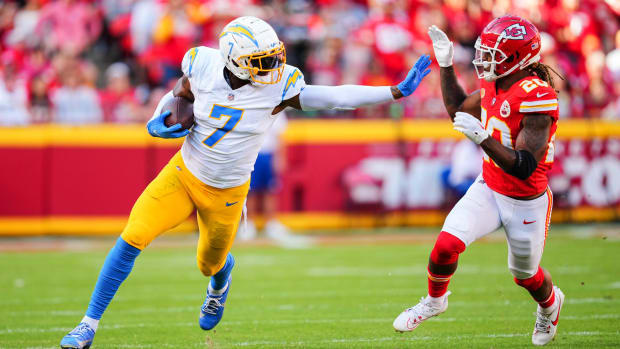Significance of 5-Game Losing Streaks in Bears History
There are plenty of theories and unverified or unsourced reports saying George McCaskey and/or Virginia McCaskey are livid over the five-game losing streak.
Some suggest heads will roll. It's all only speculation.
Past hirings and firings say the McCaskey family acts methodically over the course of a season. They weigh things carefully and let the season play out before making rash decisions. Regardless of their initial feelings, they give the coaches and front-office people the benefit of proving it over the schedule.
So anything suggesting general manager Ryan Pace and/or coach Matt Nagy are done is way too premature.
However, the last loss to the Packers seems to have crossed a threshold of sorts.
Lose four in a row and it's almost always tolerated. Lose five in a row and someone is getting it.
It wasn't always the coach, but normally it was. Sometimes it was the GM or both the GM and coach.
Now, there have been a few firings without that wall, but there was losing in mass quantity then just the same. Like in 2000, when Mark Hatley was fired and GM Jerry Angelo hired after seven losses in eight games, albeit without a five-game losing streak.
This barrier holds up fairly well since 1992, when the late Michael McCaskey decided he couldn't run the team the way he liked under the same roof as Mike Ditka, the only coach who ever won the Lombardi Trophy in Chicago.
Here's how it has worked.
Five-Game Losing Streaks = Firings
- The last five-game losing streak came in 2017. They fired John Fox after the season and hired Matt Nagy. Even in 2016 during Fox's second season the Bears didn't lose five straight and they finished 3-13 then without a firing.
- The previous Bears five-game losing streak ended the 2014 season amid all form of dissension and ridicule. That was the year of Brandon Marshall blasting Robbie Gould and Jay Cutler. It was the year offensive coordinator Aaron Kromer put Cutler under the bus and then cried during his apology to the team. It was the year Marc Trestman seemed oblivious to it all as he was too busy studyinig his voluminous playbook and thinking of odd, long-winded explanations for media questions. That was the year Trestman and GM Phil Emery were both fired.
- In 2011 Lovie Smith's team lost five straight in the stretch to finish out of the playoffs. It started with Cutler's thumb injury while trying to make a tackle on an interception in a game they won over San Diego, just when Cutler was reaching a height of his effectiveness and the Bears were 7-3. Caleb Hanie had no answers as the backup and they lost several winnable games. Smith was not fired. Instead, Angelo was fired. That brought GM Phil Emery to Halas Hall and the next year he fired Smith after a 10-6 season when they did not lose five straight, but had started out 7-1.
- In 1998 the Bears lost six straight and finished 4-12. Michael McCaskey had to fire Dave Wannstedt, his hand-picked successor to Ditka. He couldn't even hire Dave McGinnis as Wannstedt's successor without botching it up.
- In 1992 the Bears lost six straight and McCaskey did what he wanted to do ever since 1986. This too shall pass, Ditka said as he left the old Halas Hall. Ditka was right, depending on your viewpoint. The coaching changes but the ownership foul-ups have not passed.
Exceptions
There have been a few five-game losing streaks when no one was fired but those situations occurred due to obvious extenuating circumstances. Either the owner's ego got in the way or too much success in the recent past logically prevented a firing.
- Dick Jauron's team went through hell in 2002 with eight straight losses. They had key injuries to run plug Ted Washington, linebacker Warrick Holdman their quarterbacks, running back Anthony Thomas and rookie first-round tackle Marc Colombo. They also lost standout guard Rex Tucker just before the season started. They lost eight straight and finished 4-12. Oh, and they had to play all their home games in Champaign, which might have been the worst hardship of all. Considering they were coming off a 13-3 season, their best regular season in 15 years, there was no way Jauron was getting fired by Angelo even if the new GM wanted another coach. So Jauron got one more year, but a 7-9 record, including four wins in the final six game, couldn't save his job. It was a firing predetermined, a hit job, much the way Emery got rid of Smith in 2012. The GM wants his own guy and gets him.
- In 1997 they lost seven straight to start the season and no one was fired, but they had just deposed Rod Graves and hired Mark Hatley to run football operations. So they couldn't blame it on personnel. And McCaskey wouldn't fire Wannstedt because this was his own self-appointed successor to Ditka after he had acted and fired Ditka. McCaskey's ego got in the way, and so did his wallet as Wannstedt still had two years left on his deal.
- Ditka in 1989 ended the year with six straight losses. Even McCaskey had more sense than to fire their popular coach immediately after he wo five straight division titles and the only Lombardi Trophy the franchise has ever won.
2020
Was winning one division title enough for Pace and/or Nagy to survive a five-game losing streak and two straight non-playoff years?
The McCaskey family would be eating a couple years of contract cash, too, but they've done it grudgingly in the past.
History shows the Nagy/Pace regime hit the threshhold for someone's firing, unless a COVID-19 hardship can be invoked or some other miraculous fate occurs like a 4-1 or 5-0 finish to make the playoffs.
If that happens, it shreds this entire model and it's likely everyone in Chicago would forget about it—at least until the next five-game losing streak.
Twitter: BearDigest@BearsOnMaven




